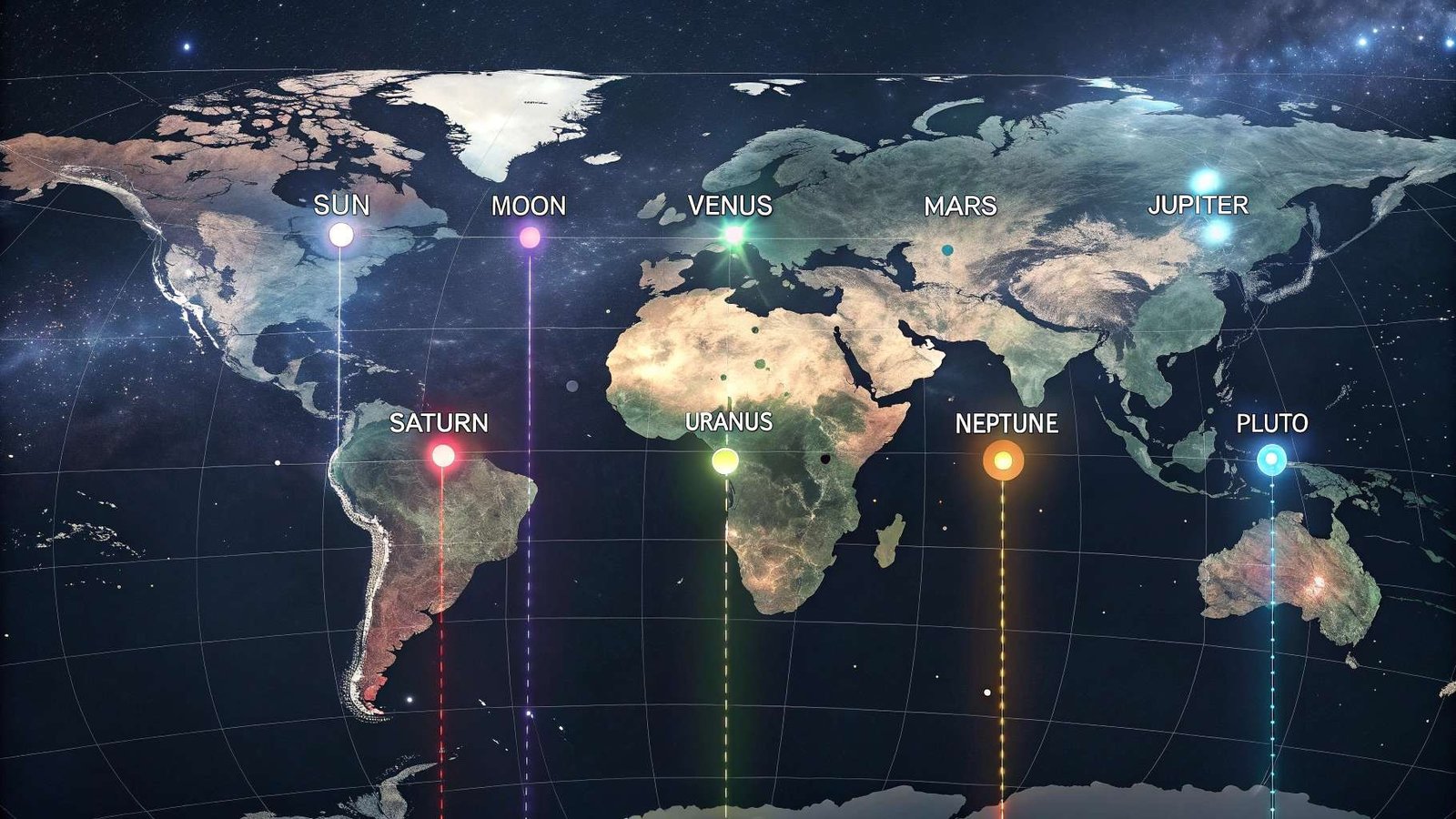Table of Contents
Have you ever felt stuck in an emotional pattern and wondered, why does this keep happening? That’s where astrological therapy and psychotherapy come in. It’s a growing approach that blends traditional psychology with the deep, symbolic language of astrology to help you understand yourself in ways that talk therapy alone might not reach.
Rather than replacing therapy, astrological counseling and astrological therapy add another layer—using your birth chart to explore emotional wounds, relationship patterns, and inner blocks. It’s about making sense of your feelings, not just fixing them.
In this blog, you’ll learn how astrological therapy works, what it reveals about your emotional world, and whether it’s the right path for your personal healing.
Key Takeaways
Integrative Healing: Astrological therapy blends psychological methods with birth chart insights for deeper emotional understanding.
Emotional Insight: Birth charts reveal emotional triggers, enhancing therapy and supporting mental health.
Complementary Approach: Astrology adds a symbolic layer to traditional therapy, enriching self-awareness. Counseling astrology, in particular, provides practical guidance and support for immediate life issues, emphasizing effective communication and empathy.
Personalized Guidance: Astrological insights allow for tailored, empathetic therapy sessions.
What Is Astrological Therapy?
Astrological therapy is a healing approach that blends traditional psychological methods with insights from your birth chart. It’s not about fortune-telling—it’s about understanding yourself on a deeper level. By looking at your astrological charts, a therapist or coach can help you explore emotional patterns, core wounds, and natural strengths that may not surface through talk therapy alone.
This method doesn’t replace standard therapy. Instead, it adds a symbolic layer that gives you more language and clarity about who you are and why you feel the way you do. For many, it’s a bridge between logic and intuition—something that speaks to both the mind and the heart. Psychological astrology, a specialized subfield, emphasizes personality growth and fulfillment, offering insights into unconscious beliefs and promoting healing.
As more people look for holistic ways to heal, astrology-based therapy is becoming more popular in wellness spaces. It’s now used alongside practices like mindfulness, journaling, and trauma-informed counseling to support emotional growth and self-awareness.
How Psychological Astrology Helps in Emotional Healing
Your birth chart can tell you a lot about your emotional world—how you process feelings, where your wounds lie, and what triggers your responses. This is why astrology is becoming a trusted tool in emotional healing.
The Moon in your chart shows your emotional style—how you react, nurture, and what makes you feel safe. Saturn points to your inner fears and where you might hold back due to pressure or self-doubt. Chiron, known as the “wounded healer,” highlights the part of you that carries emotional pain—but also deep potential for growth.
When these placements are explored in therapy, they can guide real conversations. You start to understand your boundaries, your attachment style, or why you feel stuck in certain patterns. Many therapists now use this insight to support inner child work, self-compassion exercises, and emotional release.
Therapeutic astrology is not just about knowing the placements—it’s about using them to go deeper into your healing. This approach provides a deeper understanding of your emotional experiences, offering insights that go beyond surface-level concerns.
Astrology in Therapy: How It’s Practically Used
Therapists and coaches who use astrology often start with your natal chart to open conversations that go beyond surface-level talk. Instead of just asking “how do you feel?”, they might look at your Venus placement to understand how you give and receive love—or explore your 7th house to understand patterns in your relationships. A counseling astrologer integrates astrological insights with therapeutic practices, ensuring clients leave sessions feeling empowered and hopeful.
For example, if you constantly struggle with boundaries in love, a therapist might notice a Neptune aspect in your chart and guide you through exploring that dynamic. It brings context to your story—and helps connect the dots faster.
Some practitioners offer full astrotherapy sessions, where the birth chart is integrated into counseling. Others might use transits to track emotional cycles and suggest journal prompts based on current planetary energy. It’s also being woven into models like CBT or IFS to create a more personalized, intuitive approach. Evolutionary astrology, for instance, emphasizes the spiritual lessons and personal growth associated with an individual’s life experiences, as signified in their birth chart.
At its core, astrology in therapy is about making you feel understood—and giving you a map to navigate your inner world.
What Your Birth Chart Reveals About Your Mental Health
Your birth chart isn’t just a snapshot of your personality—it also holds deep insight into your emotional life. From how you process feelings to where you hold pain, certain placements in your chart can act like a mirror, reflecting what’s going on beneath the surface. Astrological symbols offer insights into your emotional states and belief systems, facilitating self-awareness and personal growth. When used in therapy by a psychological astrologer, these insights can support healing in a more personal and intuitive way.
Moon Sign: Your Emotional Foundation
Your Moon sign reveals how you experience emotions. It shows what makes you feel safe, how you nurture others, and how you react when you’re vulnerable or stressed. A Moon in water signs (Cancer, Scorpio, Pisces) may suggest high sensitivity and strong emotional memory. Fire Moons (Aries, Leo, Sagittarius) might need more freedom and active expression to process feelings. Understanding this helps you—and your therapist—work through emotional triggers in a more aligned way.
12th House: The Hidden Self
The 12th house in your birth chart is where things hide—like buried emotions, past trauma, or even subconscious fears. It can point to anxiety, depression, or a tendency to isolate or suppress feelings. This house doesn’t always scream for attention, but it quietly influences how you carry emotional weight. Therapy informed by 12th house themes can help you safely explore what you’ve tucked away.
Saturn & Pluto: Deep Fears and Control
Both Saturn and Pluto reveal where you may carry emotional heaviness. Saturn is often linked to self-doubt, guilt, or fear of failure—it shows where you feel pressure to perform or behave a certain way. Pluto goes deeper. It represents emotional power struggles, fear of loss, and the urge to control or resist change. Working with these planets in therapy can help you understand why certain fears feel so big—and how to move through them.
Chiron: The Wounded Healer
Chiron marks the place in your chart where you’ve experienced emotional pain—but also where you have the power to grow and help others. This is often where your most vulnerable experiences live. In therapy, Chiron can be a starting point for deep healing work, especially related to old emotional wounds, self-worth, or identity struggles.
Why It Matters in Therapy
When a therapist understands these placements, they can guide you with more precision and empathy. It’s not about labeling or diagnosing—it’s about opening a window into your inner life. Birth chart therapy doesn’t give all the answers, but it often asks the right questions. And that’s where the healing begins.
Astrological Therapy vs Traditional Talk Therapy

Both astrological therapy and traditional talk therapy, such as counseling psychology, support emotional healing, but they come from very different angles. Understanding the contrast helps you decide what suits your personality, comfort level, and emotional needs best.
Astrology encapsulates ancient psychological wisdom, integrating all the psychological knowledge that figures like C.G. Jung have emphasized. This understanding of both psychological and astrological dimensions can better assist clients in therapeutic settings.
What Talk Therapy Offers
Talk therapy is rooted in psychology and backed by decades of clinical research. It includes approaches like CBT (Cognitive Behavioral Therapy), psychodynamic therapy, or trauma-informed care. Sessions are typically structured, goal-focused, and guided by a therapist trained to work with diagnoses and emotional regulation techniques.
This method works well for people who value step-by-step progress and need grounded, logical strategies to navigate mental health challenges.
How Astrological Therapy Works
Astrological therapy is more symbolic and intuitive. It doesn’t follow a clinical model. Instead, it uses your birth chart as a map to explore emotional patterns, fears, and the deeper themes that shape your inner world.
This approach often resonates with people who are spiritually curious, intuitive, or looking for insight beyond just behavior and thoughts. It can highlight emotional cycles, life themes, and personal growth opportunities that aren’t always visible in traditional models.
Why a Blended Approach Often Works Best
Many modern therapists and coaches are finding value in combining both. For instance, your birth chart might reveal recurring patterns with boundaries or self-worth. A therapist could use that insight to guide sessions, then apply grounding techniques or behavioral tools to help you make real-life changes.
Some also use current transits—planetary movements influencing your chart—to explain why you might be feeling more emotionally heavy or scattered. This makes room for both emotional validation and practical strategies.
When astrology and therapy come together, they offer a fuller picture of who you are. One gives you structure; the other gives you soul. And together, they can guide you through meaningful, lasting healing.
Can Astrology Support Anxiety, Depression, or Trauma Recovery?
Astrology Helps You Understand Emotional Triggers
Astrology can’t replace professional mental health care—but it can help you understand where certain emotional patterns come from. When you feel anxious, overwhelmed, or stuck in a cycle of low energy, your birth chart might offer clues that help you name the feeling, trace its roots, and work through it with more awareness.
Planetary Transits and Emotional Intensity
For example, a heavy Saturn transit—especially when it’s aspecting your Moon or Sun—can trigger feelings of isolation, low confidence, or emotional heaviness. During these times, therapy is vital, but astrology helps make sense of why the period feels so intense. Similarly, a Chiron return (which happens around age 49–51) often stirs old wounds or unresolved trauma. Knowing this can help you prepare, reflect, and seek the right kind of support.
A Supportive Tool, Not a Standalone Fix
The key is to use astrology as a supportive tool—not a diagnosis, not a solution, but a lens to view your healing journey more clearly. Always pair it with therapy or medical care when you’re facing mental health challenges. Together, they can offer both clarity and care.
Is Astrological Therapy Right for You?
Who Might Benefit from This Approach
Astrological therapy isn’t for everyone, but it can be incredibly powerful for the right person. If you feel emotionally stuck, keep repeating the same relationship or life patterns, or you’re curious about how your chart connects with your inner world—it might be worth exploring.
This approach often works well for people who are open to spiritual tools, value symbolism, or want to go deeper than traditional talk therapy usually allows. It’s also helpful if you’re already in therapy and want to bring in another layer of self-reflection.
When It May Not Be the Best Fit
However, it may not be ideal if you’re in crisis, dealing with severe mental illness, or prefer a strictly evidence-based approach. Astrology works best when it supports—not replaces—your healing.
How to Decide If It’s for You
Ask yourself:
Am I open to seeing myself through a different lens?
Am I willing to explore emotional patterns with guidance?
If yes, astrological therapy could be a great fit for your personal growth.
How to Get Started with Astrological Therapy
Step 1: Get Your Natal Chart
Start by getting your natal chart done. You can use a free tool like AstroSeek’s Birth Chart Calculator to see your full chart, including placements like your Moon, Saturn, and Chiron.
Step 2: Find the Right Therapist or Coach
Next, look for a therapist or coach who understands both astrology and psychology. Some are trained in both fields and specialize in astrotherapy. Check platforms like Astrology Hub or trusted therapist directories with spiritual or holistic filters.
Step 3: Reflect and Explore
Begin reflecting on your chart. Journaling can help you explore placements like your Moon (emotions), Saturn (fears), and Chiron (wounds) as entry points. Note how these themes show up in your life and bring that into your therapy sessions.
Astrological therapy is a process of learning, observing, and growing. Start where you are, and let your chart be your guide.
Conclusion
Astrology isn’t here to label you or offer quick fixes—it’s here to reflect who you are. Your birth chart doesn’t diagnose mental health conditions, but it does offer insight into how you feel, react, and grow. It shows patterns that may not always be obvious, especially when you’re in the thick of emotional pain or confusion.
The real work still happens through reflection, support, and therapy. But astrology can light the path. Psychological astrology, in particular, gives you a language to understand your emotional experiences and a framework to connect the dots between your past and present.




